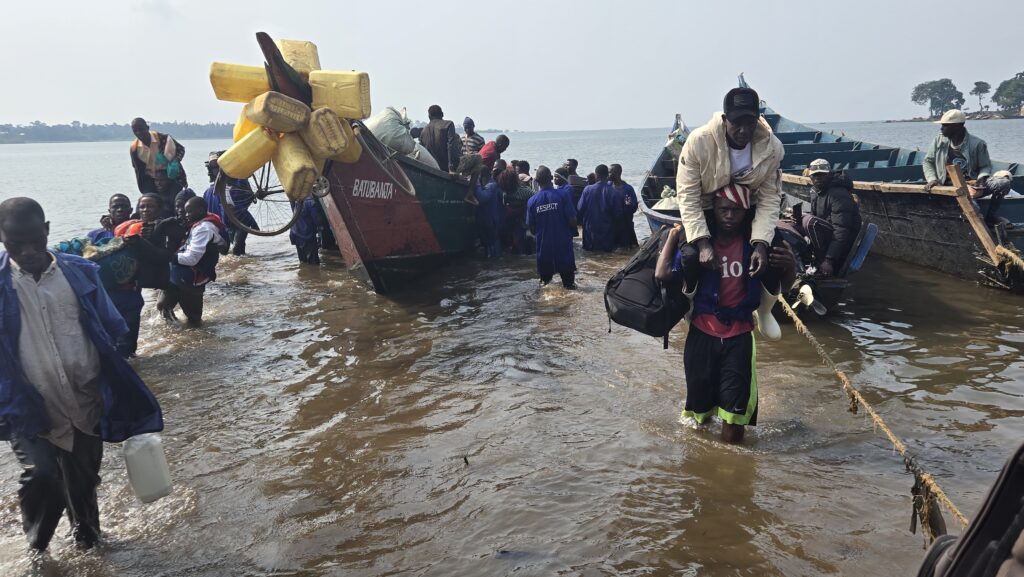
MUKONO.The Ministry of Works and Transport has started having consultations to draft regulations that will operationalise Uganda’s long-awaited Inland Water Transport Act 2021, giving hope for safer travel on water.
The new regulations are to cover safety equipment, standards for boat construction, and enforcement measures aimed at curbing the frequent , but often under-reported marine accidents.
During a community meeting with Boat owners, builders and transporters/passengers and fishermen at Katosi landing site over the weekend, Mr Brian Musinguzi, a Marine Surveyor from the Ministry, said they are currently collecting views from stakeholders to come up with good regulations .
“ The Inland Water Transport Act is in place but we have been lacking the regulations, so the feedback from Katosi and Butiaba will be consolidated into a draft regulation for government approval.” He said
Fredrick Kiapi, the project manager at Safe Transport and Survivors Support Uganda [STASSU], which is working with the ministry to come up with good regulations , said the draft is going to set minimum equipment standards such as approved life jackets and life rings, registration and inspection of vessels , harmonized fees and training of boat operators .
“ The Marine Police will also be given full mandates to investigate and report accidents, many of which currently go unrecorded,” he said.
Boat operators cry out
Boat operators say that the burden of multiple and overlapping taxes threaten their livelihoods and therefore want tax waivers on essential items, like life jackets and engines.
“ Some taxes should be abolished because there are too many , this is the reason why some fishermen are quitting this job to do other businesses ,”
Mr Maliko Muyijje, a boat operator, said
He said in his case , he pays for an operator license, local taxes at the sub-county and docking fee .
“I pay Shs.200,000 to the Ministry of Works, another Shs 250,000 and Shs60,000 to Ministry of Fisheries and to Katosi Town Council respectively ,another Shs 36,000 is paid to Kalangala District every year as docking fee and another Shs400,000 is taken to Katosi. The more sub-counties one passes pass through, the more taxes levied ,”he said .
Mr Emmanuel Ddamulira, another fisherman said although wearing a lifejacket is a requirement for all boat users , many can’t afford the standard life jackets .
‘’In most cases, when accidents happen on the lake most of the passengers die because of the substandard life jackets that cannot save their lives. The light jacket costs Shs 40,000 yet the best buys at 100,000 .Due to high taxes, a boat operator cannot buy the best life jackets for all passengers; he only gets one for himself and then buys the substandard ones for passengers,” he said
Uganda’s fishing business relies primarily on capture fishing from its large lakes, particularly Lake Victoria ,, which supplies the majority of fish for export (Nile perch and tilapia) and domestic markets (mukene). Aquaculture is also a growing sector, with a focus on Nile tilapia and catfish, serving as an important alternative to declining natural fish stocks. The sector is a vital source of income and food security for many Ugandans but faces challenges like illegal fishing and overfishing .
The Bank of Uganda (BoU) fish trading data for the year ending December 2024 paints an ugly picture of a struggling fisheries industry. Over the past 36 months, the sector has suffered sustained declines in volumes and revenues.
Uganda exports a variety of fish products—chilled, frozen, dried, smoked, maws, meal, oil, skins, and even live ornamental fish. However, revenue from these exports plunged by 21.9 percent, dropping from Shs514.5 billion ($139.84 million) in 2023 to Sh395.7 billion ($107.53 million) in 2024. The volume of officially exported fish fell by 27.8 percent, from 28,861 tonnes in 2023 to 20,818 tonnes in 2024.